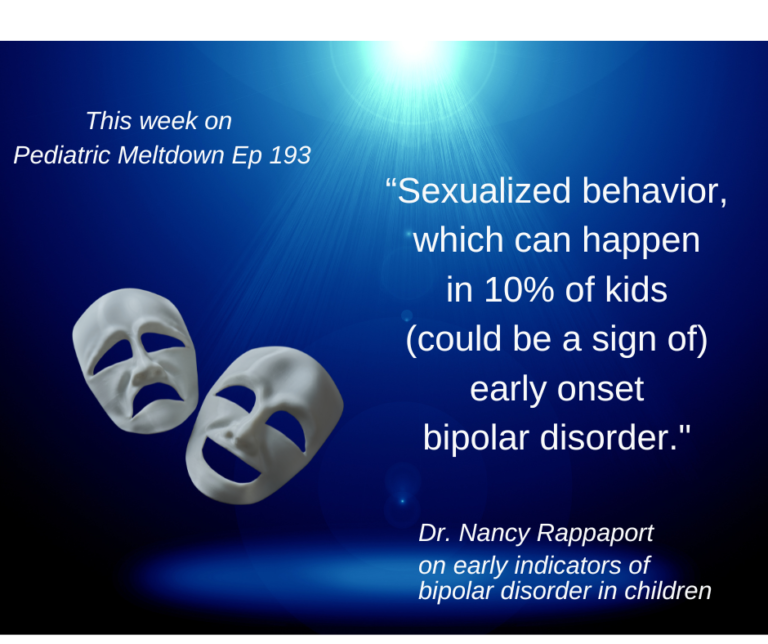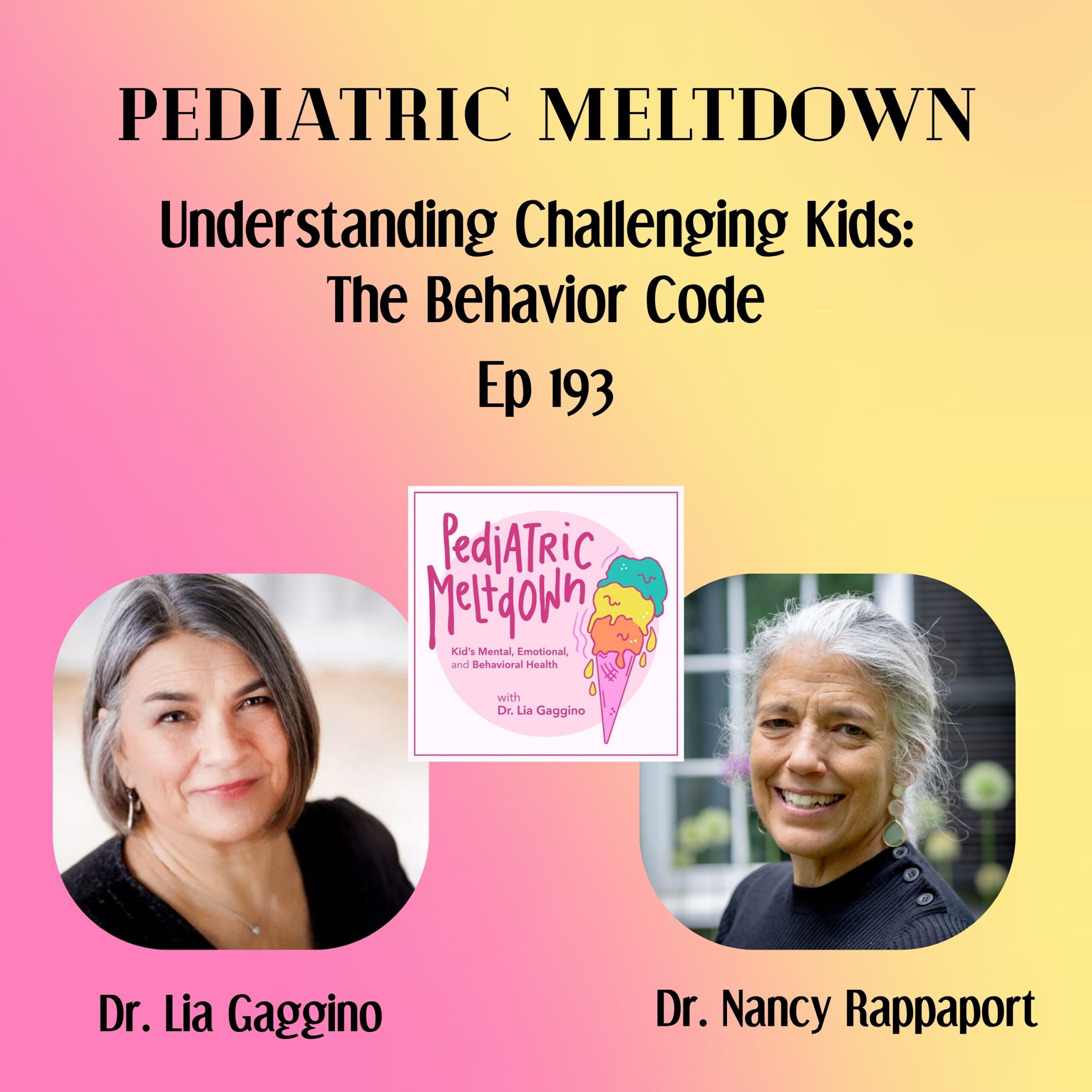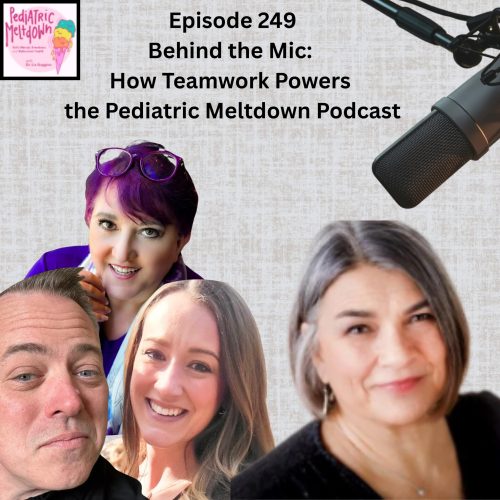Understanding Challenging Kids: The Behavior Code
Tune into this week’s episode where we sit down with the Dr. Nancy Rappaport, who shares her groundbreaking approach to comprehending and managing children’s behaviors, including anxiety-related and oppositional tendencies as well as the theory of why stepping back as a parent and allowing your children to encounter and navigate challenges by themselves is crucial for their development . Dr. Rappaport provides an in-depth look at how structured environments and small rituals can significantly improve how children cope with everyday stresses and transitions.
From addressing the influences of trauma to understanding normal age-appropriate curiosity, Dr. Rappaport provides a balanced perspective on navigating sensitive topics. She emphasizes the necessity of not misinterpreting behavioral cues, as they can vary significantly depending on a child’s personal experiences and challenges. Are you ready to learn how to respond playfully and effectively to children’s complicated behaviors? Tune in to gain unique strategies that could not only revolutionize your approach to parenting but alter how you perceive and interact with childhood behaviors forever!
[03:13 -19:31] Understanding and Managing Anxiety-Related Behaviors in Children
- Discussion on how unstructured times, transitions, social demands, and unexpected changes can trigger anxiety-related behaviors in children.
- Emphasis on the importance of creating structured environments during typically unstructured times to provide stability for anxious children.
- Introduction of tools like emotional thermometers and comfort boxes to help children manage their anxiety.
- Strategies for preparing anxious children for impending changes to reduce stress and behavioral issues.
[19:31 – 32:18] Addressing Oppositional Behaviors in Children
- Exploration of the antecedents to oppositional behaviors, including environmental triggers and emotional distress.
- The use of encouragement cards, affirmations, and undirected play to positively influence children’s behaviors.
- Importance of understanding the meaning behind behavior as a form of communication rather than simply reacting to the behavior itself.
- Psychological insights revealing that a third of children who completed suicide had shown oppositional behaviors,
[32:19 – 46:04] Strategies for Building Rapport with Withdrawn Children
- Not making assumptions about withdrawn behaviors, as these can vary drastically between children.
- Insights into how parents’ personal characteristics can influence their perception of a child’s withdrawn behavior.
- Methods for engaging withdrawn children in communication and activities at a pace comfortable for the child.
- Highlighting the reasons behind withdrawn behavior, including possible underlying health issues or past traumas.
[46:05 – 50:06] Effective Use and Concerns of Medications in Managing Child Behavior
- The use of stimulant medication and its effects on participation in regular classroom activities and field trips.
- Overprescription of antipsychotic medications for behavior management and the ensuing need for skill-building and robust support systems.
- Contrast between the child psychiatrists and pediatricians to behavior management and the synergies of their collaboration.
- The value of pediatricians in the ongoing health and wellness journey of children, especially aligned with psychiatric insights.
[50:07 – 57:37] Closing segment Takeaways
Links to resources mentioned on the show
Her website: https://www.nancyrappaport.com/
Behavior Code resources: https://www.nancyrappaport.com/writing/books/
Youtube: https://www.youtube.com/channel/UC-XFOQcPLNFFUzWnUiuwrdQ
Books:
The Behavior Code: A Practical Guide to Understanding and Teaching the Most Challenging Students. https://www.amazon.com/Behavior-Code-Practical-Understanding-Challenging/dp/1612501362
In Her Wake: A Child Psychiatrist Explores the Mystery of Her Mother’s Suicide
Ross Greene: The Explosive Child: A New Approach for Understanding and Parenting Easily Frustrated, Chronically Inflexible Children
Other episodes you may like:
https://pediatricmeltdown.com/episodes
- Explosive Outbursts in Kids: Guide to Diagnosis and Treatment
- ADHD: Strategies for Boosting Executive Function
- The 3 B’s – Brain, Body, Behavior: Managing Anxiety
Key quotes for Twitter:
“I don’t think we do enough praising young people for the sacrifices that they were willing to make. That were sort of imposed on them. But, they stayed home sometimes for a year, 2 years to keep us safe”…. Dr. Nancy Rappaport on recognizing young people’s contributions during the Pandemic
“And I think when you think that a child’s disruptive behavior is because they’re trying to manipulate you, you immediately stop being curious and you feel punitive.”…. Dr. Nancy Rappaport on understanding childhood behavior
THANK YOU FOR YOUR SUPPORT!
Pediatric Meltdown was listed as a Top 20 Pediatric Podcast on FeedSpot.
If you’d like to connect with me, you can Tap the “What Are Your Thoughts” button at the top of the notes or you can find me on LinkedIn, Facebook, Instagram, and Twitter, or email me at gagginol@gmail.com. To learn more about me visit https://www.pediatricmeltdown.com/ or reach out, DM me on IG, FB or LI and if you’d like to chat set up a discovery call to talk about your needs and challenges: https://calendly.com/gagginol/discovery-call
LOVE WHAT YOU HEARD? Leave us a 5-star review so we can continue to provide you with great content. Share this episode and help people know more about children’s health and well-being.









